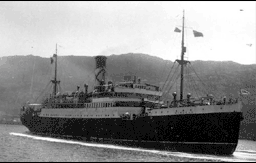Joseph Davidson’s Account Of The Sinking
From the Book “The Atlantic Star” by W. H. Allan
A gunner aboard a Defensively Equipped Merchant Ship (DEMS) was Joseph Davidson of the Royal Artillery who manned the Bofors and Oerlikon guns of the 5,583-ton Nerissa- The ship was well laden with war supplies outward bound from Halifax, Nova Scotia, to Liverpool.
At about midnight on the last day of April Lieutenant-Commander Erich Topp in U-552 was in contact with the convoy. With the recent vanquishing of Kretschmer, Prien and Schepke, Topp was now the leading ace U-boat commander and the Nerissa, his latest victim, was hit by three torpedoes. Davidson and his gun’s crew were off duty and quite unaware of the impending attack. Davidson was actually playing the mouth organ at the time of the explosions. The ship began sinking immediately.
The water came into the lower deck where we had our bunks: within two minutes the water was up to our knees. It was at this stage we tried the steel door leading to the after deck which was jammed tight by the explosions. There was tremendous panic, everyone frightened, no lights. We scrambled along to midships where there was a terrific hole and fire. Myself and others managed to grab hold of a large piece of thick timber…and smashed the steel door open … we escaped through this opening and made for the lifeboats to find there was no time to lower them mechanically as the ship was sinking too fast.
Showing great resourcefulness Davidson shouted through the fire and smoke for everyone to jump into the sea. He always carried a knife on his belt and with this he cut the restraining ropes and tried to push the lifeboat clear:
Eventually we were adrift of the ship [in a lifeboat], only to find that the drain-off plug was missing and therefore taking in water very fast. I was at this time swimming alongside the boat. I jumped into it, found a handkerchief or piece of rag in my pocket and wrapped it around my finger and plugged the hole. After about an hour we found the plug but I had a terrible time getting my finger out which was thick and swollen and very painful.
Davidson believes that the U-552, now surfaced, fired flares and used machine-guns against the survivors in the water. The sinking ship was also fired upon…and there were terrific explosions … white-hot metal, timber and various things from the ship … Next morning at approximately 1100 we saw a flying boat and signaled as best we could.
In due course the old destroyer Veteran rescued the survivors of Nerissa, reported by Davidson as only 87 out of approximately 300 men and women. He was taken to Londonderry:
We were there for about six weeks for medical attention and treated very kindly. We were fitted out with civilian suits then sent to Belfast. From there to Heysham Dock, and hitch-hiked to Liverpool where we reported to our pool or depot. We were asked where we had come from and a lot of ridiculous questions. We were told that as far as they were concerned we were lost at sea.
However, reality overcame bureaucracy and Davidson was soon offered another berth. Gunner Liddiard of the Royal Artillery refers to the supposed secrecy which should have shrouded the jobs of army gunners aboard seagoing ships. He was ordered to proceed to North Shields by rail:
… taking my personal kit and the Lewis gun, spares and ammo with me! When I reached Liverpool Street Station in London I left my equipment on the platform and reported to the RTO (Railway Transport Officer) who laid on a lorry to take me to King’s Cross where I boarded a train for Newcastle. There I hauled my gear from the train and loaded it on to a trolley and pushed it to the electric railway which served the coastal towns including North Shields. When I finally arrived it was late at night as there was no transport waiting for me. I asked one of the porters if he could give me the telephone number of the local artillery base, but he told me not to worry about my kit and to leave it on the platform for the night. When I suggested this might be a bit risky, he replied ‘Everyone does it. We know all about your lot – you’re all seagoing gunners!’

